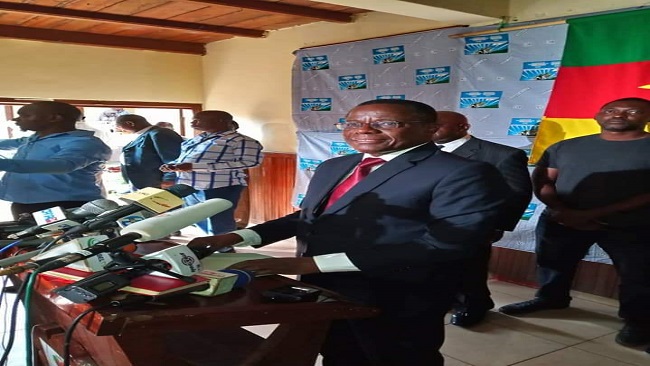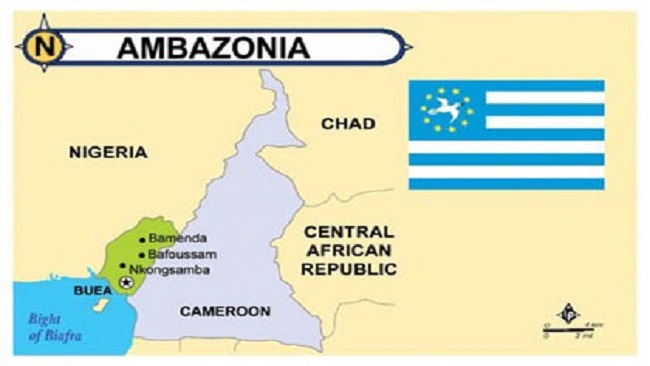24, February 2019
Senegal: Presidential election begins, incumbent tipped to win 0
Senegal went to the polls Sunday in an election that incumbent President Macky Sall is tipped to win after his main challengers were banned from running.
His two biggest rivals in the first-round vote in the West African nation — popular former Dakar mayor Khalifa Sall and Karim Wade, the son of the previous president — were disqualified after corruption convictions in trials questioned by rights groups.
People queued in large numbers as the polling station opened at Fatick in the center of the country, where Sall, 56, cast his ballot, as well as at Thies in the west, AFP reporters said.
But the start of voting was delayed at Grand-Yoff, the stronghold of Khalifa Sall.
“I want to get home as soon as possible, I’m frightened there will be violence on election day,” said 25-year-old voter Fatoumata Sall.
“I hope this election goes off peacefully and that tomorrow everyone will be going about their business — that will mean a peaceful vote,” said accountant Lamine Diatta after he cast his ballot in Dakar.
President Sall, a former geologist who first took the presidency in 2012 after beating his former political mentor Wade, campaigned for a second term pitching his “Emerging Senegal” infrastructure project to boost economic growth.
“Victory in the first round is indisputable,” Sall told a recent Dakar campaign rally, seeking to emulate all three of his predecessors by landing a second term — Abdoulaye Wade needed just one round in 2007 to secure his second term.
Often held up as a model of stability in Africa, Senegal has enjoyed strong growth. The Muslim-majority country has largely escaped the militant attacks that destabilized neighbors such as Mali.
Sall made infrastructure a priority, including a new airport, motorways, and a rail link. But basic services, healthcare, and education often remain inadequate, sometimes triggering strikes and protests.
Sall faces competition from four lesser-known rivals who campaigned hard against his plans for a second phase of his project, which critics see as a waste of taxpayers’ money and a potential debt burden.
His rivals are former prime minister Idrissa Seck, Issa Sall of the Unity and Assembly Party (PUR), former justice and foreign minister Madicke Niang, and tax inspector-turned MP Ousman Sonko.
The five-horse race leaves voters with a limited choice compared to 2012, when 14 candidates vied for the top post, and 2007, when 15 battled it out for the presidency.
Preliminary results were expected soon after polling closes at 1800 GMT on Sunday, but will only become official a day or two later.

Some 6.7 million in a population of around 16 million are registered to vote in a country which gained independence from France in 1960.
‘Lack of independence’
A candidate must get more than 50 percent to prevent a second-round runoff.
If no one wins more than half the ballots, a second vote is provisionally scheduled for March 24. The exact timing will be determined by how long it takes to officially proclaim the first-round results, and whether there is a challenge.
A new system approved by parliament last year despite opposition party challenges requires candidates to demonstrate they have the support of a minimum number of citizens and regions.
Once the new regulations were applied, only seven candidates made the cut, two of whom were then disqualified. Both Khalifa Sall and Karim Wade have claimed their criminal convictions were engineered to rule them out of the race.
Supporters of the convicted men staged demonstrations, while rights group Amnesty International spotlighted “unfair trials” in Senegal, and a “lack of independence” by the judiciary in Khalifa Sall’s case.
Senegal has known two peaceful power transfers in 2000 and 2012, and no coups. But election campaigns are often marred by charges of corruption, disinformation, and sometimes violence.
Recent clashes between supporters of rival parties left two dead at Tambacounda, 420 kilometers east of the capital.
Authorities also reinforced security and legislation, sometimes at the cost of freedom, according to rights groups.
Officials said 8,000 police were on duty in urban areas alongside an undetermined number of civilian security staff. The interior ministry said some 5,000 observers — including 900 from abroad — were monitoring proceedings.
Opposition rallies have recently been banned and pre-trial detention for people suspected of “terrorism” extended from 48 hours to 12 days.
(Source: AFP)





















25, February 2019
Cameroon Slowly Moving To A War Zone 0
In recent years, Cameroon – a peaceful country in Central Africa ruled by President Paul Biya – has transitioned from a tranquil harbor to a site of horror. The Cameroonian army has been battling with Boko Haram militants on the northern border alongside security forces from Nigeria, Niger, and Chad. The conflict has registered over 20,000 dead and 2.4 million people displaced. The former French colony has also been struggling with a secessionist uprising in the English- speaking Northwest and Southwest Regions since 2016, with hundreds of deaths over the course of the confrontation. Furthermore, clashes with rebels from the Central African Republic in Bertoua and a very tense political atmosphere have plunged the country into an unending crisis.
Many of these crises are attributed to the unlawful arrest of Professor Maurice Kamto, the main opposition leader in Cameroon, after his organization of peaceful protests in the towns of Douala and Yaoundé on 28 January, 2019. Kamto was arrested at the home of a leading supporter, Albert Dzongang, before Dzongang and other supporters such as Christian Penda Ekoka, Alain Fogue, and Celetine Djamen were also arrested for participating in the organization of these peaceful protests.
It was clear from the evidence Kamto brought forward to the Constitutional Council before the announcement of the winner of the 2018 presidential election in Cameroon that Paul Biya supporters affected the results of the election in favour of his party, the ruling Cameroon People Democratic Movement (CPDM).
While protests went viral in Cameroon under Kanto’s leadership of the Movement for the Rebirth of Cameron (MRC), some fifty protesters opposed to Biya broke into the country’s Paris embassy, vandalizing portraits of him. The demonstrators filmed themselves invading the empty offices in the French Capital’s 16th district around 7: 00 PM on Saturday, broadcasting the protest live on Facebook. However, French law enforcement agents forced them out of the building and onto the street two hours later, where they continued their protest outside the embassy. Daniel Essissima, one of the protesters, stated: “The Cameroon administrators are taking Cameroonians for idiots… …They cannot bring people to rock-bottom like this. In the anglophone regions the army is killing people; in Douala, they are firing with real bullets.”
Because the attack on the Cameroonian Embassy in Paris took place on the same day as the protest organized in Cameroon, the Cameroonian authorities have since linked both demonstrations without providing any proof of this conclusion. Kamto vehemently denies these claims, separating himself from any violent attack perpetrated at Cameroon’s diplomatic mission abroad.
Following Kamto’s arrest, around 300 people gathered outside Dzongang’s house, and on Saturday 117 people were arrested during protest marches in several towns. Kamto has continued to claim he was the rightful winner of last October’s presidential election, which saw veteran leader Paul Biya win a seventh consecutive presidential term. The MRC has blasted this election as an “electoral hold-up.” Paul Biya has been ruling Cameroon since 1982 with the support of the army, government administrations, and the CPDM.
International Condemnation of Kamto’s Arrest
Last month, human rights groups condemned Kamto’s arrest and called for his immediate release, orders which fell on deaf ears. The European Union this month accused Cameroon of a “disproportionate use of force” in dispersing the protests. “Finding a solution to the challenges faced by the country can only be achieved through dialogue in a calm and inclusive atmosphere where fundamental rights and the rule of law are respected,” stated EU spokesman Maja Kocijancic. Amnesty International said the arrest of Kamto and his staff “signals an escalating crackdown on opposition leaders, human rights defenders and activists in Cameroon.” Amnesty International’s West and Central Africa director Samira Daoud claimed that “instead of taking steps towards improving the country’s human rights record, we are witnessing the authorities becoming less and less tolerant of criticism. This must stop.”
Professor Kamto Post-Arrest
After being taken to the Groupement Special d’Opération (GSO) in Yaoundé, Kamto appeared before judges in the Military tribunal on Friday 1 February, 2019 and charges against him were made known to the public. Kamto is being charged with insurrection, hostility against the fatherland, group rebellion, and public disorder. Just last week, Kamto and fellow party members Albert Dzongang, Clestine Djamen, Christian Penda Ekoka, and Paul Eric Kingue were all transferred to the Principal Prison in Kondengui while investigations are ongoing. This action by the government goes a long way to instill fear and repression in the heart of any group that wants to take to the street for any type of demonstration. Minister Atangana Nji in the Ministry of Territorial Administration and Decentralization threatened to withdraw the MRC’s party licence, while Minister of Communication Rene Emmanuel said that because Kamto protest disrupted public order and perpetrated various assaults he will face the court’s judgement.
It is very clear that after President Biya and his supporters fixed the election in their favour it will be difficult for the people of Cameroon to express their dissatisfaction, even when their fundamental human rights have been violated by the present administration. The only means by which the Cameroonian people can express gross dissatisfaction, through peaceful streets protests dubbed “white marches,” has been taken away from them and led to unending new forms of crisis.
Source: Organisation For World Peace